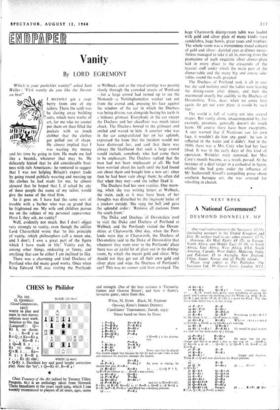Vanity.
By LORD EGREMONT
'Which is your partickler.wanity?' asked Sam Weller : wanity do you like the flavour on best?'
I RECENTLY got a rasp- berry from one of my itailors. There (he said) was he slaving away building ".7 suits, which were works of art, for me who no sooner put them on than filled the pockets with so much clobber that the clothes / got pulled out of shape. He almost implied that I / was wasting my money and his time by going to him. He made me feel like .a beatnik, whatever that may be. He delicately hinted that he did considerable busi- ness with rich Americans: he ventured to suggest that I was not helping Britain's export trade by going round publicly wearing and messing up the, clothes he had made for me; he almost Mottled that he hoped that,. I, if asked by any of these people the name of my tailor, would give the name of the rival firm. . So it goes on. I have had the same sort of trouble with a barber who was sp grand that he frightened me. My wife and children pursue me on the .subject of my personal appearance. Have I, they ask, no vanity? . , Well, evidently not much. But I don't object very strongly to vanity, even though the ochous Lord Chesterfield wrote that 'to this principle of vanity, which philosophers call a mean one, and I don't, I owe a great part of the figure which I have made in life.' Vanity can be, among other things, endearing or funny, and anything that can be either I am inclined to like. There was a charming and kind Duchess Of /)ortland who did many good works. Once when King Edward VII , was visiting the Portlands at Welbeck, and as the royal cortege was passing slowly through the crowded streets of Worksop —for a large crowd had turned up to see the Monarch—a Nottinghamshire worker ran out from the crowd and, pressing his face against the window of the car in which the Duchess was being driven, ran alongside baring his teeth in a hideous grimace. Everybody in the car except the Duchess and her chauffeur was much taken aback. The Duchess bowed to the grimacer and smiled and waved to him. A courtier who was in the car congratulated her on her aplomb, expressed the hope that the incident would not have distressed her, and said that there was always the likelihood that such a large crowd would include. somebody who had come there to be unpleasant. The Duchess replied that the man had not been unpleasant at all. He had been worried about his teeth until she had found out about them and bought him a new set: since then he had been vain about them; he often did that when they met--and she rather liked it.
•
The Duchess had her own vanities. One morn- ing, ing, when she was writing letters at Welbeck, the train, such as it may have been,, of her thoughts was disturbed by the incessant noise of a Cuckoo Outside. She rang. the .bell and gave the splendid order: 'Remove all cuckoos .from the south front.' The Dille, and pucheqs Of DeVonshire used to visit the Duke and Duchess of Portland at Welbeck and the Portlands visited the Devon- shires at Chatsworth. One day, when the Port- lands were due at Chatsworth, the Duchess of Devonshire said to the Duke of Devonshire that whenever they went over to the Portlands' place there was an awful lot of plate out in the dining- room, by which she meant gold and silver. Why shoUld not they get out all their own gold and silver plate and wipe the Duchess of Portland's eye? This was no sooner said than arranged. The huge Chatsworth dining-room table was loaded with gold and silver plate of many kinds—vast candelabra, huge bowls, great vases and trophies. The whole room was a tremendous visual concert of gold and silver: dazzled eyes at dinner never- theless managed to take it all in, moving from the pianissimo of each exquisite silver dinner-plate laid in every place to the crescendo of the heavier stuff under which the main part of the dinner-table and the many big and ornate side- tables round the walls groaned. The Duchess of Portland took it all in too; but she said nothing until the ladies were leaving the dining-room after dinner, and then she murmured sweetly but audibly to the Duchess of Devonshire, 'Evie, dear, when we come here again, do get out your plate; it would be such fun.'
The world is full of vanity cut into several shapes. But vanity alone, unaccompanied by for example, paranoia, generally doesn't do much harm. Of course there have been exceptidns. A seer warned that if Narcissus saw his own face, it wouldn't do him any good: he saw it reflected in the water and it didn't. And in the 1930s there was a Mrs Cory who had her face lifted. It was in the early days of this kind of operation. Wrinkles were removed, but Mrs Cory's mouth became, as a result, pursed. At the instance Of a deaf verger in a cathedral in Spain, whither she had gone under the influence of Mr Sacheverell Sitwell's compelling prose about southern baroque art, she Was arrested for whistling in church.






























 Previous page
Previous page